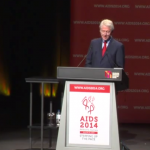NIH’s Dr. Carl Dieffenbach Shares Highlights from Wednesday at AIDS 2014
At the conclusion of another science-filled day at the 20th International AIDS Conference (AIDS 2014Exit Disclaimer) in Melbourne, Australia, we caught up again with Dr. Carl Dieffenbach from NIH/NIAID to hear about what he thought were highlights of the day.
He pointed, first, to the address by former President Bill Clinton who spoke about the work of the Clinton Health Access InitiativeExit Disclaimer (CHAI) and its work around the globe to expand access to HIV care and treatment. Observing that, “we know treatment is the most effective tool we have to fight HIV/AIDS,” President Clinton made the case that not only can we afford to meet the new WHO guidelines on HIV prevention, diagnosis, treatment and care for key populationsExit Disclaimer, “we can’t afford not to.”

Dr. Dieffenbach’s second highlight of the day was a plenary presentationExit Disclaimer by Dr. Diane Havlir of the University of California, San Francisco about HIV and tuberculosis (TB) coinfection. Dr. Havlir spoke about advances in TB prevention with isoniazid (INH), the medication used to treat latent TB infection, as well as promising research on combining available drugs to shorten TB therapy. The latter is important because shorter, less costly, better tolerated, TB treatment regimens compatible with anti-retroviral therapy are urgently needed to address this prevalent comorbidity.
Watch Dr. Dieffenbach’s video remarksExit Disclaimer above.
Check back tomorrow for Dr. Dieffenbach’s next daily science highlight from AIDS 2014.
About AIDS 2014
Gathered under the theme of “Stepping Up the Pace,” some 12,000 participants from 200 countries around the world have gathered in Melbourne for the 20th International AIDS Conference, known as AIDS 2014. This biennial gathering for those working in the field of HIV, including scientists, medical practitioners, activists, policymakers, people living with HIV and others committed to ending the epidemic. For more coverage from the conference visit AIDS 2014.